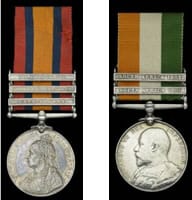South Africa 1901-02
The Regiment sailed from India and arrived at Durban in December 1901. After being stationed in the Newcastle district for a short time, they and the 20th Hussars were brigaded under Colonel Nixon and were employed in the last great drives, chiefly in the extreme northeast of the Orange River Colony, when many of the enemy were taken. This column was responsible for many of these captures, and in Lord Kitchener’s dispatch of 8th April 1902 he mentioned that “Colonel Nixon reported the discovery of three Krupp field guns which were found hidden in the bed of a tributary of Liebensberg’s Vlei”.
Dealing with an earlier drive, Lord Kitchener stated that Colonel Nixon had on the night of 26th February 1902 “successfully repulsed an attack by a large number of the enemy upon the line of the Cornelius River”.
During the Second Boer War, the British forces entered the territory of the Orange Free State and occupied the capital Bloemfontein on 13 March 1900. Five months later, on 6 October 1900, the British government declared an official annexation of the full territory of the Orange Free State, despite the fact that the British had not yet occupied the full territory of the state, nor defeated the Free State forces.
Following the end of the war in South Africa, 507 officers and men of the regiment returned to India on the SS Ionian in October 1902, where they were stationed in Sialkot in Punjab Province.
The 3rd Hussars was awarded the battle honour: SOUTH AFRICA 1902.
Gallantry Awards
- Maj WG Murray DSO
- 3032 RSM W Derrett DCM
- 2847 SSM TW Summerton DCM
- 3208 Pte H Shenton DCM (3H reservist)
Campaign Medals
 The Queen’s South Africa Medal was awarded to all those who served in the Boer War in South Africa between 11th October 1899 and 31 May 1902.
The Queen’s South Africa Medal was awarded to all those who served in the Boer War in South Africa between 11th October 1899 and 31 May 1902.
The King’s South Africa Medal was the second campaign medal for the South African or ‘Boer War’, awarded to all those who were in theatre on, or after the 1st January 1902, and had completed 18 months of service in the conflict prior to 1st June 1902.
Service did not have to be continuous, the recipient would have had to serve from December 1900 to have 18 months of service before the war ended in May 1902.
Medal Clasps:

